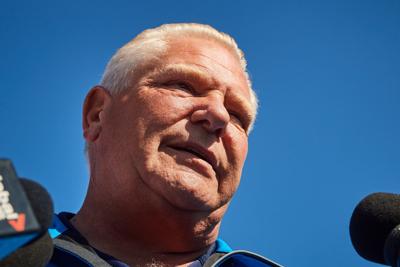Ontario is expected to experience the lowest economic growth in Canada over the next year, due to business uncertainty created by United States tariffs, says a report by the Financial Accountability Office of Ontario.
Despite Premier Doug Ford’s battle against the tariffs imposed by U.S. President Donald Trump, demand for Ontario exports has declined as has business investment and hiring, said the , which provides an outlook on the provincial economy and finances over the 2024-25 to 2029-30 period.
In more bad news for Ford, the FAO projected the provincial budget balance will “deteriorate” from a deficit of $1.3 billion in 2024-25 to a deficit of $12 billion in 2025-26 due to economic strife along with current government policies and commitments.
The report also predicted an unemployment rate of eight per cent in 2026 and said┬áthat the province’s debt will jump from $408.0 billion in 2023-24 to $549.3 billion in 2029-30.
A caveat to the outlook, the report said, is the fact that “the actual impact of tariffs on OntarioÔÇÖs economy is highly uncertain and will depend on the magnitude, breadth and duration of tariff coverage, as well as how businesses, households and economies respond.” The unemployment rate, it said, is expected to improve in the two years starting in 2027.
Colin Blachar, spokesperson for OntarioÔÇÖs Finance Minister, disputed the FAO’s predictions.
“Ontario’s finances are stronger today than they have been in over a decade. In the last year alone, we earned two credit rating upgrades and increased revenue by nearly $70 billion since taking office, without ever raising a tax on the backs of OntarioÔÇÖs hardworking families,” Blachar said.
“As highlighted in the 2025 budget, we remain on a clear path to balance by 2027-28, as we work to protect our economy and make Ontario the most competitive place to do business in the entire G7.”
The FAO report, Blachar said, “reflects a moment in time” and does not “encompass the entirety of the province’s finances.”
The FAO said Ontario will likely adjust to the impact of the U.S. tariffs during the outlook period and as a result, “real GDP growth is projected to return to its average long-term trend of 1.9 per cent per year.”
At Queen’s Park yesterday, opposition parties jumped on the FAO report to decry the Ford government’s fiscal performance.
ÔÇťI want to put an end ÔÇö once and for all ÔÇö to the myth that Doug Ford and his PC government are good economic managers. They are not. They are unable to balance the books,” said Liberal MPP Stephanie Bowman (Don Valley West.)┬á
NDP MPP Jessica Bell (University-Rosedale) said the FAO’s report exposes the reality of life for many.
ÔÇťThat means thousands more Ontarians out of┬áwork and families left wondering how they will pay the bills,” Bell said. “These are not just numbers in a┬áreport. This is about peopleÔÇÖs livelihoods and security.ÔÇŁ
Ontario’s Green Leader Mike Schreiner said, ÔÇťOnce again, the numbers tell the story: the Ford government is spending more to deliver less and Ontarians are paying the price.”
Error! Sorry, there was an error processing your request.
There was a problem with the recaptcha. Please try again.
You may unsubscribe at any time. By signing up, you agree to our and . This site is protected by reCAPTCHA and the Google and apply.
Want more of the latest from us? Sign up for more at our newsletter page.



























To join the conversation set a first and last name in your user profile.
Sign in or register for free to join the Conversation